Node.Js 22: All the Latest Features and Updates
May 13, 2024
Home >> Python >> Python for Game Development: Should You Develop Games in Python?
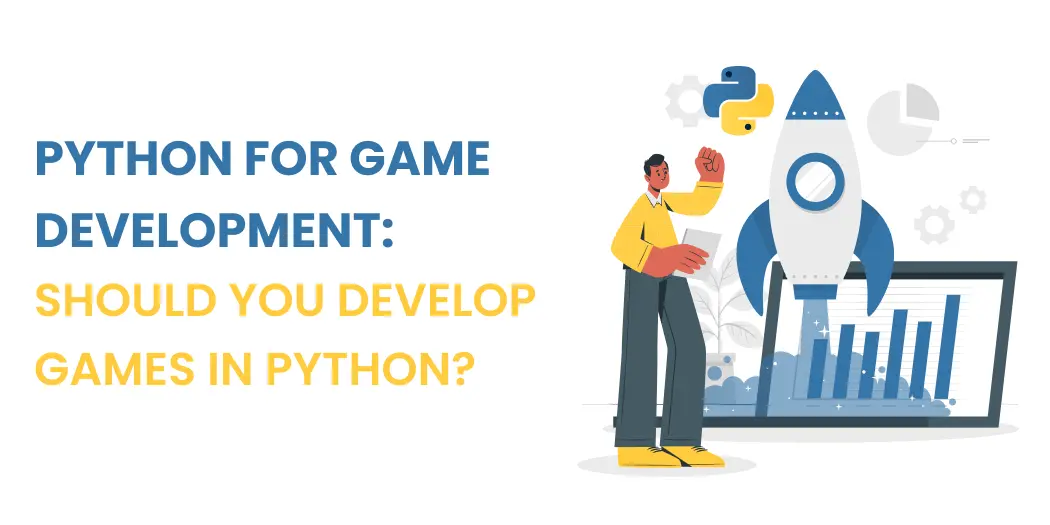
Python’s popularity is soaring in game development and other industries. Python has various advantages for game development due to its user-friendly syntax, vast library environment, and strong community. This post’ll look at Python’s appropriateness for game development and assess its pros and limitations. In addition, we will share insights and advice for efficiently using Pygame and other Python game development tools. Whether you’re a novice or a seasoned programmer, understanding the pros and considerations of using Python for game development will help you make educated decisions and fully use the language’s potential to build intriguing games.
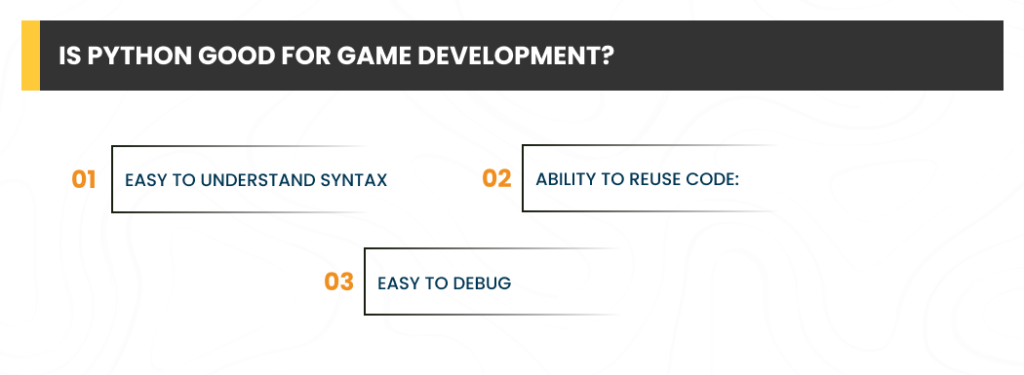
Due to its straightforward syntax, adaptable object orientation, abundant libraries and frameworks, dynamic typing, strong community support, and compatibility with AI integration, Python is a popular choice for game development. Python excels in game development, enabling faster and efficient game production.
Python is a great option for novices in game creation because of its straightforward syntax. Developers can create code quickly and maintain it over time thanks to its readability and clear structure, which smooths the learning curve and increases productivity.
Modular programming is supported by Python, which encourages code reuse in game creation. Developers can save time and effort by producing libraries or simple modules to integrate into various gaming projects. As a result, the development process is made more effective and scalable and reusable code components may be produced.
Python’s outstanding debugging abilities are only one of the benefits it has for game development. Developers can quickly find and fix bugs in game code by using tools like PDB (Python Debugger). Python is a great choice for game development because of the simplified debugging process that boosts productivity and guarantees fluid gameplay.
Want to have a secure and scalable dynamic application to fulfill your business requirement
Hire from our team of Python Developers for successful enterprise-grade application development.
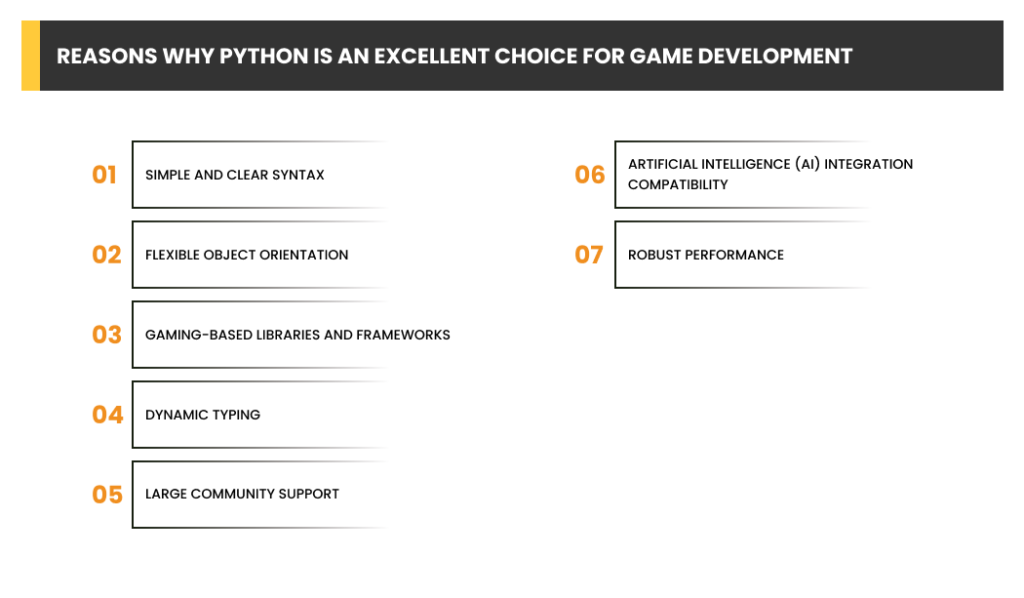
Python is an excellent choice for game development due to several reasons:
Python is user-friendly for beginners and enables developers to create code fast and effectively because of its clear and simple syntax. This simplicity facilitates quicker development iterations and lowers the learning curve.
Python’s support for object-oriented programming enables programmers to divide their work into modular, reuseable parts. This encourages code reuse, maintainability, and scalability, which makes managing complicated game projects simpler.
Pygame, Panda3D, and Pyglet are just a few of the gaming modules and frameworks available in Python. These libraries offer pre-built tools and functions for game creation, allowing designers to produce games more quickly.
Python’s dynamic typing capability enables programmers to swiftly write code and modify modifications. This adaptability is useful throughout the iterative game development process.
Python has a sizable and vibrant developer community that shares expertise and contributes to open-source projects. This community support ensures game makers can access materials, guides, and answers to problems they could encounter when creating games.
Python is a good option for building game AI features because of its simplicity and interoperability with AI packages. Developers may easily include AI algorithms into their games to improve gameplay and create clever adversaries or characters.
Despite being an interpreted language, Python provides enough performance for most game development requirements. Additionally, developers may improve their code in places where performance is crucial by using the NumPy and Cython libraries.
“Python for Software Development: Everything You Need to Know”
– Also Read Article
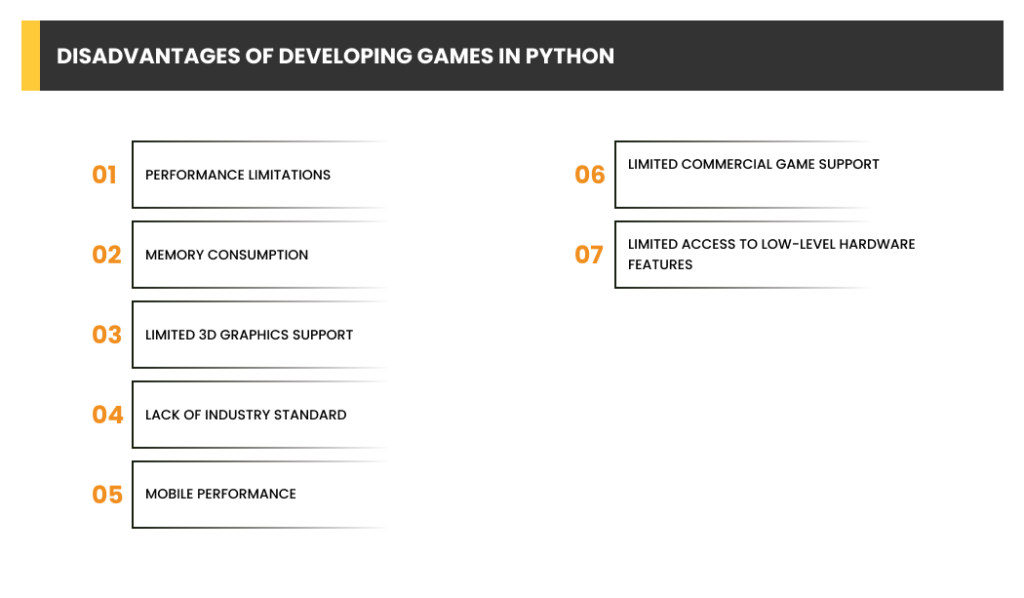
Despite its advantages, Python has some limitations and considerations to remember for game development. Here are a few drawbacks:
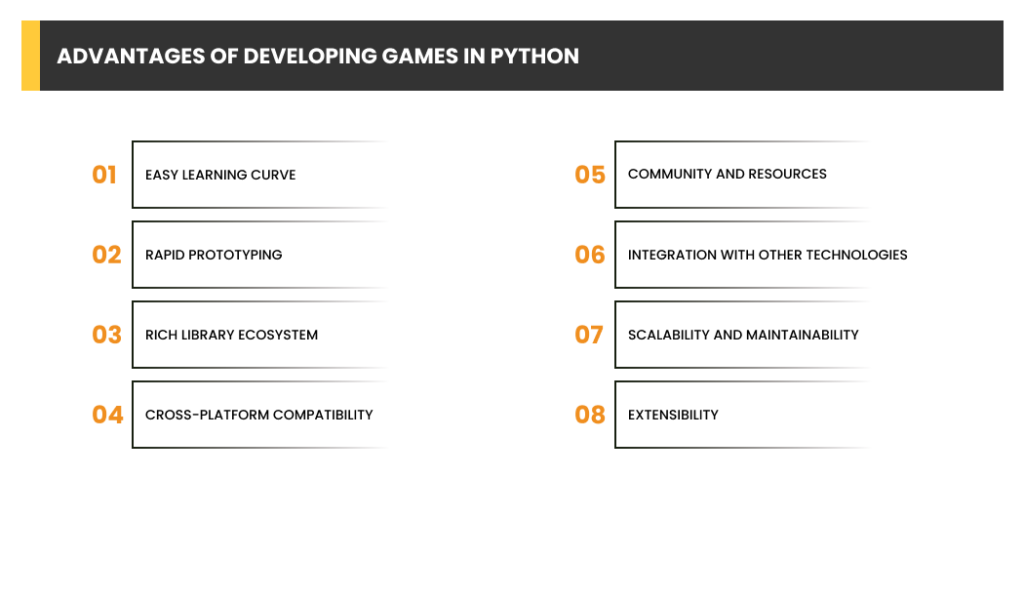
Python for game development brings numerous advantages that attract game developers, including its simplicity, rich library ecosystem, and strong community support.
Are you tired of using outdated technologies for software development?
Let our Python Development Company help you take your business to the next level with the latest tools and techniques.
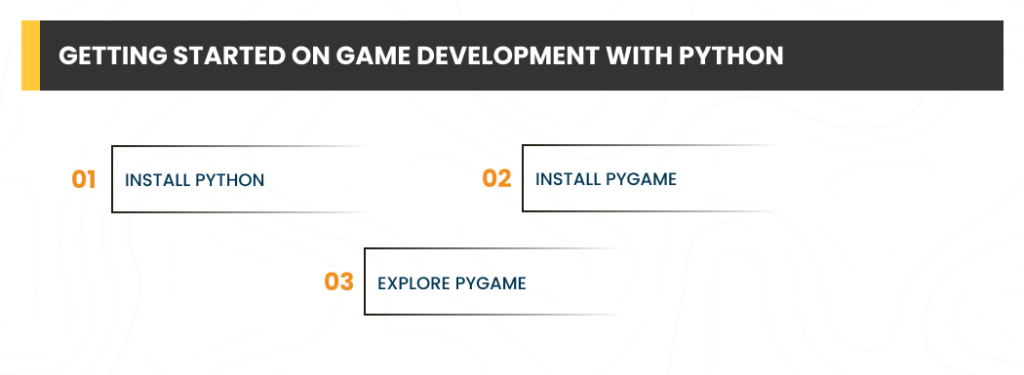
Use frameworks like Pygame to get your Python game development off the ground. A well-known package called Pygame offers features and tools for creating 2D games. Here are the essential steps to follow:
Python is a popular programming language for game creation due to its multiple benefits. Its concise syntax and broad library support make it simple to learn and use, letting developers to iterate rapidly and enhance productivity. The robust Python community offers vital resources and assistance. Python’s object-oriented design promotes code reuse and scalability, making it suited for simple and big gaming applications. Furthermore, Python’s interoperability with AI integration allows for the development of intelligent game elements. While Python has certain limits, its overall benefits make it a good choice for developers, particularly those just starting in the game development sector.
You can make games in Python and C++ both but developers often prefer to use Python because it is easier to read and learn compared to C++ and C#.
You can’t directly use Python in Unity but you can install third-party software like Python Script Editor and many more to write Python code and run it in Unity.
Yes, Python can definitely be used to make games. Python is a versatile programming language that offers a wide range of libraries and frameworks specifically designed for game development. While it may not be as commonly used as languages like C++ or Unity, Python has gained popularity among game developers due to its simplicity and readability.
One of the most popular libraries for game development in Python is Pygame. Pygame provides a set of modules and functions that allow developers to create interactive games and multimedia applications. It handles tasks such as rendering graphics, handling input from the user, playing sounds, and managing animation.

Digital Valley, 423, Apple Square, beside Lajamni Chowk, Mota Varachha, Surat, Gujarat 394101
+91 9913 808 2851133 Sampley Ln Leander, Texas, 78641
52 Godalming Avenue, wallington, London - SM6 8NW